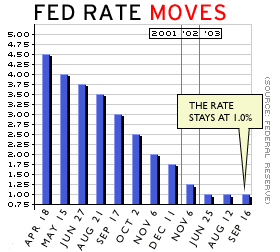NEW YORK (CNN/Money) -
Federal Reserve policy-makers held a key short-term interest rate steady Tuesday, saying they still were concerned about a drop in inflation despite signs of strength in the world's largest economy.
The Fed's policy-making Federal Open Market Committee (FOMC) left its target for the federal funds rate, an overnight bank lending rate that affects other key bank rates, at 1 percent -- the lowest in more than 40 years.

At its last policy meeting, in August, the FOMC also left rates alone.
In its statement, closely watched by investors for clues about future policy, the Fed said that even though business spending has improved, the labor market has weakened, and it was still worried about a dangerous "unwelcome fall" in already-low inflation.
"The Committee judges that, on balance, the risk of inflation becoming undesirably low remains the predominant concern for the foreseeable future," the statement said. "In these circumstances, the Committee believes that policy accommodation can be maintained for a considerable period."
Translation: the Fed, the nation's central bank, is likely to hold interest rates at rock bottom for as long as possible.
| Related stories
|

|
|
|
|
The Fed's action was widely expected, and stocks rallied smartly on Wall Street while Treasury bond prices were mixed. Stock investors like low interest rates since they tend to boost economic growth and thus, corporate profits.
The Fed's statement appears to have been worded with an eye on financial markets, the Treasury bond market in particular.
This summer, many analysts said, the Fed had not effectively signaled its intention to keep rates low for a long time, thus unintentionally allowing long-term rates to rise in the bond market. The Fed's acknowledgement Tuesday of recent labor market weakness could convince bond investors that a Fed rate hike isn't imminent.
"The point about labor market weakening suggests the Fed's ... worried about that," David Jones, chief economist at DMJ Advisors, told CNNfn. "That drives home the point they're going to keep these rates unchanged for a long period of time."
Job growth still distant
The Fed has cut rates 13 times since the start of 2001, helping to fight off the effects of a recession, terrorist attacks, corporate scandals, war and more. The central bank cuts rates to lower the cost of borrowing, pumping money into the economy when it thinks activity is too slow. When inflation is a risk, the Fed raises rates.
Though consumer spending has stayed strong since the 2001 recession, business spending and factory output has been spotty, and the labor market has stubbornly refused to heal.
Recently, fueled in part by child tax credit checks and money from mortgage refinancings, consumer demand has accelerated and manufacturing output has increased. Most economists hope this surge in activity will finally spur hiring and job growth.
But job growth is still a promise rather than a reality -- payrolls fell again in August, and the number of weekly jobless claims has crept back above the 400,000 level, a sign of labor-market weakness.
Fed Governor Ben Bernanke -- a voting member of the FOMC -- has said in recent speeches that it could be several months before the stronger economy creates jobs, and spurs more pricing power. In fact, he and San Francisco Fed President Robert Parry, also a voting FOMC member, have hinted that another rate cut was not out of the realm of possibility, if jobs don't start growing soon.
What's more, though the Fed spent decades battling inflation, and falling prices are certainly good in the short run for consumers, another drop in inflation -- or "disinflation," in Fed-speak -- could help set the stage for the nasty condition known as deflation, when prices spiral lower, crippling consumers, corporate profits and the economy.
The government reported Tuesday that a key measure of consumer price inflation, excluding food and energy prices, rose at a 1.3 percent pace in the 12 months ending in August, the slowest rate since February 1966.
"The Fed is concerned about this, and it has a reason to be concerned," said Robert Brusca, chief economist at Native American Securities in New York. "There's no pricing power, and they're watching this very warily."

|

